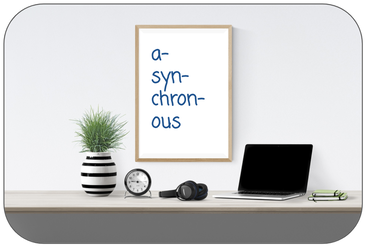|
ThI recently saw a Twitter post that called for replacing asynchronous with "anytime" and synchronous with "real time." Certainly these words are a mouthful! Children are likely to love learning them, however, even young children.
Since learning to read words depends on hearing words and building our phonological lexicons (the brain's collection of every word we have ever heard), I really love the idea of children hearing the words synchronous and asynchronous and thinking about what they mean. Furthermore, synchronous and asynchronous are really juicy words when it comes to learning morphemes-- the smallest units of meaning in a language. Consider the morphemes in synchronous. syn = with, together chron = time ous = full of So synchronous literally means "full of time together." And then, adding a- to the beginning of synchronous illustrates that this prefix negates the term, as in "not full of time together." How fun is that?! And what a missed opportunity if we choose to replace them with "real time" and "anytime" instead! But wait, there's more. The most powerful benefit of children learning these two words and the morphemes that compose them is that these morphemes can help children later figure out other words built with the same parts. Such as, photosynthesis synchronize synergistic chronological synthesizer synonym synopsis anachronistic chronograph chronic delicious adventurous conscious The idea that learning a few morphemes and then repurposing them to build new words--kind of like the way my sons use Legos--is vocabulary learning magic. To teach children how to figure out words by using known parts is to truly empower them to do the work (and it is fun!). So, please, don't think of synchronous and asynchronous as terrible words that are too hard for children to learn. Think of them as invitations. Think of them as the powerful intersection between print and meaning, where reading process comes together. You don't have to water down the words you use with children, hampering the growth of their phonological lexicons. In fact, if we combine knowledge of morphemes with agentive vocabulary exploration during independent reading, the effects on vocabulary growth can be synergistic!
1 Comment
11/23/2020 03:40:01 pm
I really like how morphemes can be so fun to teach students and the idea that they are very important for the literacy growth of the students. If students know how to recognize morphemes and their individual meaning, then they can extend their knowledge in finding morphemes in vocabularies that they don't know. I think as teachers, we tend to walk away from vocabulary that seem complex and unfamiliar, but we have to remember that these "big" words are just composed of many small parts that connected give a new meaning. And that's the beauty of literacy.
Reply
Leave a Reply. |
AuthorDr. Jan Burkins is a full-time writer, consultant, and professional development provider. Categories
All
|

 RSS Feed
RSS Feed